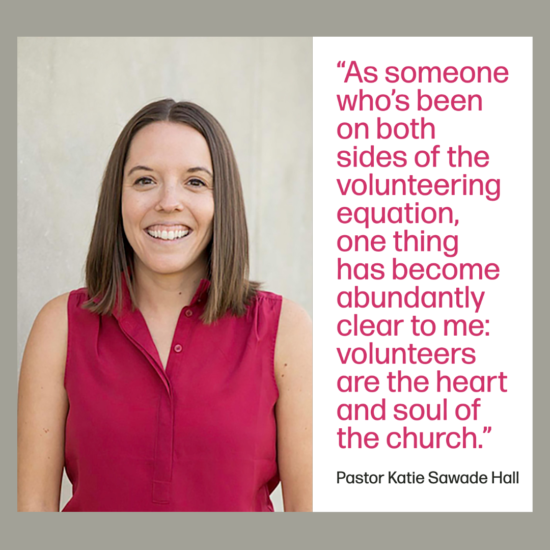 Long before I was a pastor, my experience with church ministry was that of a volunteer. Growing up in the FMC as a pastor’s kid, I helped with a little bit of everything–from teaching CLC and singing in choirs, to painting on church workdays.
Long before I was a pastor, my experience with church ministry was that of a volunteer. Growing up in the FMC as a pastor’s kid, I helped with a little bit of everything–from teaching CLC and singing in choirs, to painting on church workdays.
My first pastoral position was children’s pastor at a fairly large church, where I oversaw more than 100 volunteers. I’ve also overseen volunteers in other ministry settings, such as mission trips, church retreats, and the elementary children’s program at General Conference. As someone who’s been on both sides of the volunteering equation, one thing has become abundantly clear to me: volunteers are the heart and soul of the church.
Even as I affirm my own pastoral vocation, I celebrate the priesthood of all believers. In Paul’s first letter to the church at Corinth, he compares the church to the human body: “As it is, there are many members, yet one body. The eye cannot say to the hand, ‘I have no need of you,’ nor again the head to the feet, ‘I have no need of you’” (I Corinthians 12:20-21). Paul gives us a vision of the interconnected nature of the church and reminds us that every single member has something of value to offer the body.
Part of our job as pastors and church leaders is to inspire and empower the volunteers we work with. If we truly desire to create a culture in which our volunteers can thrive, we must be intentional about equipping them. There is no formula for this process, but I’ve found a few things helpful in my own ministry settings.
- Fight the urge to settle for warm bodies. Keeping volunteer-driven ministries staffed is an endless task, and the temptation to recruit anyone with a pulse is strong. When you’re struggling to get volunteers, you may find yourself simply asking people you know will say, “yes”, regardless of their giftedness or actual interest. But this is problematic for a few reasons. First, these kinds of volunteers are much more likely to burn out quickly. If they’re not there because they want to be or because they are serving in ways that are meaningful to them, they won’t stay long. Second, just because they’re willing doesn’t mean they’re a good fit. I can think of some parishioners, for example, who may not be a good fit to work with children. The wrong person in a role could be worse than no person. Third, choosing anyone who will say, “yes” undercuts the value of the ministry you’re trying to support. It sends the message that you don’t care enough to find people who will be a good fit. When we take the time to discern who will best serve specific roles, our ministries are better for it.
- Don’t overestimate your own importance. As someone who hated group projects in school, I understand all too well the allure of micromanaging. It ensures that things happen the way you want them to, when you want them to. But operating ministries this way shows a lack of imagination. Who says that your vision of success is necessarily the best one? Micromanaging also ensures that ministries you oversee can’t succeed without you. That’s both unhealthy and unsustainable. Do the work of equipping your volunteers. Give them books to read. Mentor them. Let them try new things and take initiative. By empowering your volunteers to lead, you’ll remind both them and you that you’re replaceable. And that’s how it should be. Long after you’ve moved on to another appointment or ministry setting, those ministries will continue to thrive. (Thanks be to God!)
- Be honest about your limitations. As a leader, you want to be the one that people look to and trust. But you’re going to have bad ideas. And you’re going to make mistakes. Being honest about this doesn’t make you look weak. It makes you a better leader. Admit to your volunteers when you’re wrong. Ask them for their input and their advice. And when they have better ideas than yours, amplify and implement those ideas! If something isn’t working, don’t be afraid to change course. Not only will your ministries fare better, but your volunteers will be more invested (and stay longer).
- Help people move past an understanding of volunteer ministry as obligation. I’ll never forget the phrase I heard my first year as children’s pastor. When I asked someone if they’d like to serve in the nursery, their response was, “I’ve already done my time.” This person compared working with kids to a prison sentence. Ouch. This statement was telling on many levels. The person clearly didn’t enjoy working in the nursery, and I wanted a volunteer that desired to work with younger children where it was mutually beneficial for both the volunteer and the children. It also helped me realize that so many people see ministry as nothing more than an obligation. And that’s a problem. I recognize that a certain amount of sacrifice and self-denial is integral to the Christian life. But God gave us different personality traits and strengths for a reason. Let’s help people discover a fuller understanding of ministry: that in the body of Christ, ministering can, and should be, life-giving.
- Remember that your volunteers are more than what they can do for you. Sometimes we get so caught up in running effective ministries that we forget our volunteers have lives outside of the church. And we start to think of people only in terms of how they can benefit us. Fight this tendency by reminding yourself that your volunteers are made in God’s image and that their value doesn’t come from how much they produce or achieve. (For that matter, remind yourself that this applies to you too!) Find ways to get to know and support your volunteers outside the bounds of your ministry. And when you see that they’re overwhelmed or stressed out, encourage them to take time off — even if that means losing them as a volunteer.
When we do the hard work of investing in our volunteers and lifting them up, the body of Christ is richer for it. And so are we. What a gift!
About the Author
Katie Sawade Hall is Associate Pastor at Community of the Savior, a Free Methodist congregation in Rochester, New York. Before that she served as Children’s Pastor at Bedford Free Methodist Church in Bedford, Indiana. She is married to Andy Hall and they have a one-year old daughter named Ellie.
